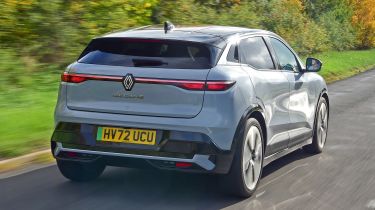Renault Megane E-Tech review: running costs & insurance
The electric Renault Megane’s five-year/100,000-mile warranty isn’t class-leading, but generous enough to provide drivers with peace of mind over your average lease contract
| Insurance group | Warranty | Service interval | Annual CC cost (20%/40%) |
|---|---|---|---|
| 26-27 | 5yrs/100,000 miles | 2yrs/18,000 miles | From £148/£296 |
It might not be the cheapest electric family car we’ve tested recently, but the Megane E-Tech’s price tag is on par with the Kia Niro EV, or the equivalent Cupra Born or Volkswagen ID.3. Better still, Renault’s electric hatchback will cost less to run for both private buyers and company-car drivers than the petrol, diesel or hybrid Meganes that came before.
Renault Megane E-Tech insurance group
The Megane E-Tech falls into insurance group 26 or 27 depending on which trim level you go for. That is an increase over the recently discontinued, petrol and diesel-powered Renault Meganes, but at least the new EV’s key rivals – the Cupra Born, MG4 EV and Kia Niro EV – all attract very similar insurance ratings, making the Renault no more expensive to cover.
Warranty
The electric Megane comes with a generous five-year/100,000-mile guarantee, while the battery itself receives an eight-year warranty. The former isn’t quite as lengthy as a Niro EV or MG4 EV’s seven-year warranty, but it’s still pretty good and will provide you with sufficient coverage over a three or four-year lease.
Servicing
According to Renault, the Megane E-Tech requires a service every two years or 18,000 miles – whichever comes soonest. Being an electric car, servicing costs should not only be cheaper as they are required less frequently, but due to the Megane’s simple EV powertrain, there's fewer parts to maintain, too. A service can range from anything from £130-200, so it’s worth checking with our local Renault dealer for exact pricing.
Road tax
As with all electric cars, you don’t need to pay any vehicle excise duty (VED, otherwise known as road tax) with the Megane E-Tech until 2025. It’s also exempt from the London Congestion Charge until 2025 and for the next few financial years attracts a low 2% Benefit-in-Kind company-car tax rate – significantly less than the old petrol, diesel or plug-in hybrid Meganes.
Depreciation
Unless you’re a company-car driver or have money to burn, you’re probably wondering how well the Renault Megane E-Tech holds onto its value – especially given how this can have a big impact on monthly finance payments. In this regard, the electric Renault hatchback falls into the middle of the pack; according to the latest industry data, the Megane E-Tech will hold onto roughly 49% of its value over three years and 36,000 miles of ownership, which is roughly the same as the Volkswagen ID.3. Entry-level Tesla Model Y RWD models, while more expensive, will retain almost 65% of their value over the same period.

